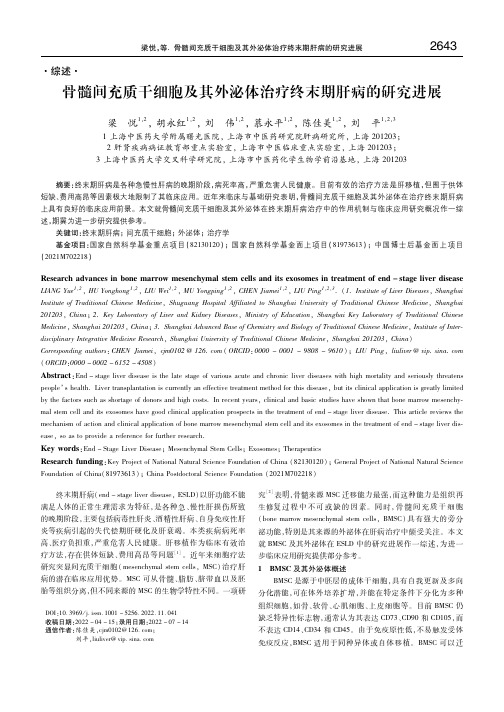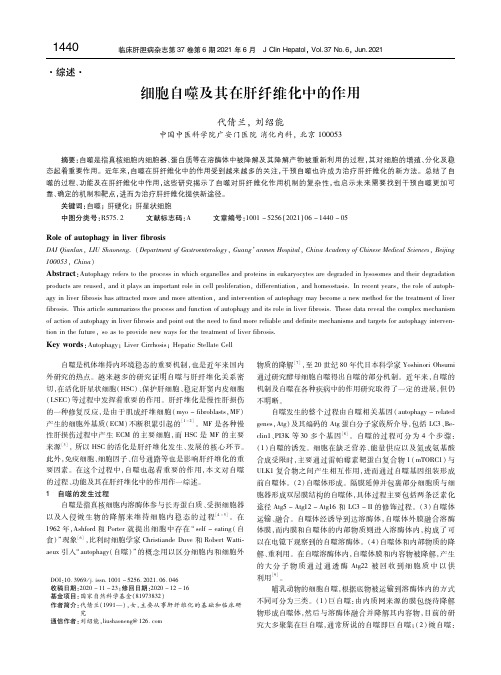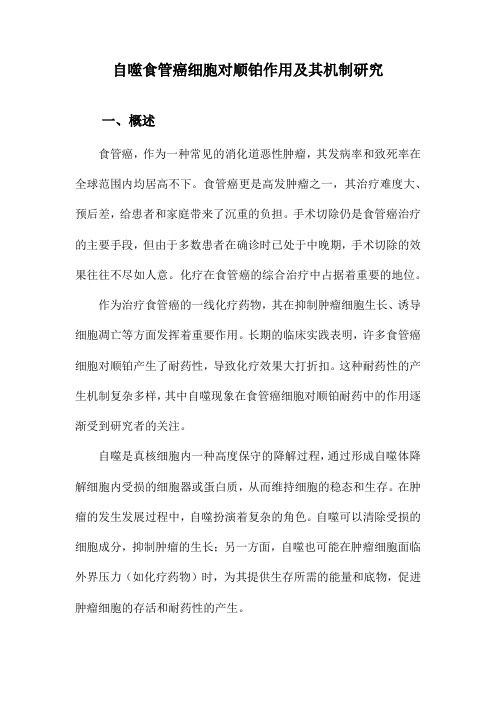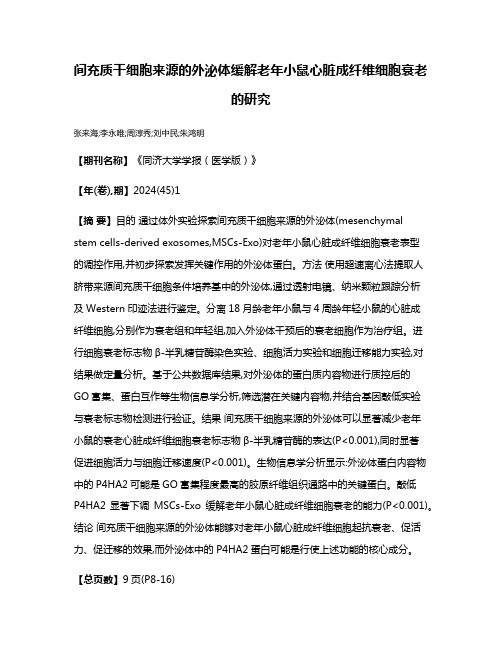间充质干细胞通过激活肝内胆管癌的自噬促进化疗抵抗机制研究
自噬在免疫调节中的作用机制

自噬在免疫调节中的作用机制引言:自噬是一种细胞内的重要修复和清除机制,其在维持细胞稳态、应对应激以及抵御感染方面起着关键作用。
在免疫调节中,自噬参与了多种重要的过程,包括抗原呈递、免疫细胞发育和活化以及免疫耐受等。
本文将探讨自噬在免疫调节中的作用机制。
一、自噬与抗原呈递1. 自噬对抗原处理和递呈起到关键作用自噬通过形成双层膜囊泡(autophagosome)将特定物质、包括蛋白质和细胞器等,吞噬进细胞溶酶体进行降解。
这个过程涉及多个关键分子,包括微管相关蛋白1A/1B轻链3 (LC3) 和Beclin-1等。
在专业抗原呈递细胞如树突状细胞(dendritic cells, DCs)中,自噬被认为是生成并提供MHC-II负载抗原的重要途径。
细胞内异源抗原可通过自噬途径进入MHC-II担载物运输途径,最终呈递给T淋巴细胞。
2. 自噬参与坏死细胞相关抗原的表达坏死细胞释放出一些独特的抗原,称为坏死肽。
自噬过程促进了这些坏死肽的产生和处理,并实现对这些抗原的有效呈递。
具体而言,当细胞发生坏死时,自噬相关蛋白会被活化并协助生成MHC-I负载抗原以供杀伤性淋巴细胞识别。
二、自噬与免疫细胞发育和活化1. 自噬参与淋巴结构和功能形成在淋巴系统中,自噬被发现在B细胞和T 细胞的发育、存活和活化中起到重要作用。
自噬能够调控B 细胞单克隆选择以及TNF-R相关因子(TRAF)介导信号转导通路的激活,在淋巴器官结构和功能形成中发挥重要作用。
2. 自噬参与调节免疫细胞的功能和存活自噬在调节免疫细胞的功能和存活中发挥重要作用。
例如,在T 细胞中,自噬通过限制氨基酸供应来调控T 细胞增殖和活化。
此外,自噬还参与调控巨噬细胞的特异性发育和活化,从而对免疫应答产生重要影响。
三、自噬与免疫耐受1. 自噬参与T 细胞耐受的形成在机体内部,为了维持自身免疫的平衡,很多T 细胞需要处于一种非激活状态。
这种非激活状态被称为耐受。
迄今为止,有证据表明,自噬在T 细胞耐受形成中起到重要作用。
外泌体在肝内胆管癌中的作用

外泌体在肝内胆管癌中的作用唐晋元1,杨陈凤麟1,梁冬乐2,罗雨豪11 西南医科大学附属医院肿瘤科,四川泸州 6460002 廊坊市人民医院肿瘤科,河北廊坊 065000通信作者:罗雨豪,*********************.cn(ORCID: 0000-0002-7489-5770)摘要:肝内胆管癌(ICC)是一种特殊类型的肝癌,其早期临床症状不典型,大多数患者初诊时已处于中晚期。
由于缺乏有效的分子标志物和治疗手段,ICC患者5年生存率极低。
外泌体是一种细胞分泌的囊泡,包含蛋白质、RNA、脂质等,是细胞间通讯的重要载体。
近期研究显示外泌体在ICC发生发展过程中扮演重要角色,本文就外泌体在ICC中的诊断、治疗作用及其机制进行综述,并展望外泌体的治疗前景与潜在的临床应用。
关键词:胆管上皮癌;外泌体;诊断;治疗学基金项目:国家自然科学基金(81903000);四川省自然科学基金(2023NSFSC1846)Role of exosomes in intrahepatic cholangiocarcinomaTANG Jinyuan1, YANG Chenfenglin1, LIANG Dongle2, LUO Yuhao1.(1. Department of Oncology, The Affiliated Hospital of Southwest Medical University,Luzhou,Sichuan 646000,China;2. Department of Oncology,Langfang People’s Hospital,Langfang,Hebei 065000, China)Corresponding author: LUO Yuhao,*********************.cn(ORCID: 0000-0002-7489-5770)Abstract:Intrahepatic cholangiocarcinoma (ICC) is a special type of liver cancer with atypical clinical symptoms in the early stage,and most patients are already in the advanced stage at the time of initial diagnosis. Due to a lack of effective molecular markers and treatment options,ICC patients tend to have an extremely low five-year survival rate. Exosomes are vesicles secreted by cells that contain proteins, RNA, and lipids, and they are important carriers of intercellular communication. Recent studies have shown that exosomes play a crucial role in the development and progression of ICC, and this article reviews the role and mechanism of exosomes in the diagnosis and treatment of ICC and looks into the future treatment prospect and potential clinical application of exosomes.Key words:Cholangiocarcinoma; Exosomes; Diagnosis; TherapeuticsResearch funding:National Natural Science Foundation of China (81903000); Natural Science Foundation of Sichuan Province (2023NSFSC1846)肝内胆管癌(intrahepatic cholangiocarcinoma,ICC)是一种具有胆管细胞分化特征的胆管上皮恶性肿瘤,占所有类型原发性肝癌的10%~15%。
自噬在肝细胞癌治疗中的研究进展

自噬在肝细胞癌治疗中的研究进展1㊀210002㊀东部战区总医院秦淮医疗区全军肝病中心2㊀通讯作者,E⁃mail:leep2002@163.com571100㊀海南海口㊀海南现代妇女儿童医院检验科王华强,李㊀平1,2㊀㊀ʌ摘㊀要ɔ㊀自噬是细胞在自噬相关基因的调控下利用溶酶体降解自身受损的细胞器和大分子物质的过程㊂自噬对肝细胞癌的发生㊁发展具有双重作用,既能通过维持肝脏稳态清除癌细胞,又能促进肿瘤微环境中癌细胞增殖㊂目前研究发现针对肝细胞癌治疗的传统化疗药物㊁分子靶向药物㊁RNA干扰和天然药物等均与自噬关系密切㊂大部分情况下抑制自噬可增强药物抗肝癌的活性,也有药物可直接激活自噬依赖性性癌细胞死亡㊂本文结合近年国内外研究现状,就自噬与肝细胞癌发生发展的关系和自噬调控肝细胞癌治疗的作用作一综述,以期为肝细胞癌的治疗提供新思路㊂㊀㊀ʌ关键词ɔ㊀肝细胞癌;㊀自噬;㊀机制;㊀治疗中图分类号:R735 7㊀㊀文献标识码:A㊀㊀文章编号:1009⁃0460(2021)01⁃0089⁃05Researchprogressofautophagyinthetreatmentofhepatocellularcarcinoma㊀㊀WANGHuaqiang,LIPing.DepartmentofClinicalLaboratory,HainanModernWomenandChildrenHospital,Haikou571100,ChinaCorrespondingauthor:LIPing,E⁃mail:leep2002@163.com㊀㊀ʌAbstractɔ㊀Autophagyisaprocessinwhichcellsuselysosomestodegradetheirdamagedorganellesandmacromoleculesunderthecontrolofautophagy⁃relatedgenes.Autophagyhasadualeffectontheoccurrenceanddevelopmentofhepatocellularcarcinoma.Itcannotonlymaintainthesteadystateoftheliverbyeliminatecancercells,butalsopromotetheproliferationofcancercellsinthetumormicroenvironment.Thecurrentresearchfoundthattraditionalchemotherapydrugs,moleculartargeteddrugs,RNAinterferenceandnaturaldrugsforthetreatmentofhepatocellularcarcinomaarecloselyrelatedtoautophagy.Inmostcases,inhibitionofautophagycanenhancetheactivityofdrugsagainstlivercancer,andsomedrugscandirectlyactivatingautophagy⁃dependentcancercelldeath.Inthisarticle,wewillreviewtherelationshipbetweenautophagyandtheoccurrenceanddevelopmentofhepatocellularcarcinoma,andtheroleofautophagyinregulatingthetreatmentofhepatocellularcarcinomainordertoprovidenewideasforthetreatmentofhepatocellularcarcinoma.㊀㊀ʌKeyWordsɔ㊀Hepatocellularcarcinoma;㊀Autophagy;㊀Mechanism;㊀Therapy㊀㊀在全球范围内,肝癌是导致癌症相关死亡的第四大常见原因,在发病率方面排第6位㊂肝癌以肝细胞肝癌(hepatocellularcarcinoma,HCC)为主,尽管近年HCC的内科治疗和外科手术方面取得了很多突破,但5年生存率仅为18%,仅次于胰腺癌的第二大致死性肿瘤[1]㊂近年来大量研究表明,自噬可以对HCC产生促进或抑制的双向调节,调控自噬可影响HCC的治疗㊂本文总结了自噬与HCC发生发展的关系以及近年自噬调控HCC治疗的相关研究,通过全面了解自噬在HCC中的作用,以期为HCC的治疗提供新思路㊂1㊀自噬对HCC发生发展的双向影响1 1㊀自噬与肿瘤发生相关㊀自噬又称Ⅱ型细胞死亡,是细胞在自噬相关基因的调控下将自身受损的细胞器和大分子物质运输到溶酶体进行消化降解的过程[2]㊂自噬在肿瘤发生发展中所扮演的角色具有促进和抑制双面作用㊂在正常情况下,细胞自噬是一种抵抗癌变的途径,自噬可以控制炎症反应㊁清除损伤坏死的细胞器㊁降低细胞内压力㊁稳定细胞基因组㊁阻止癌细胞恶变,并可以通过介导细胞凋亡和免疫反应清除癌变细胞㊂另一方面,细胞一旦发生癌变,自噬反而会扮演促进肿瘤的角色,自噬可维持肿瘤细胞稳定,为肿瘤细胞提供营养物质及能量,增强肿瘤细胞放化疗抗性等[3]㊂这种双重作用说明了自噬在肿瘤发生发展中的复杂性,深入了解自噬的调控作用,对于探索肿瘤发生机制并开拓新的治疗途径具有重要意义㊂1 2㊀细胞自噬抑制HCC㊀细胞自噬有利于维持肝脏的代谢稳态,一旦自噬缺陷可导致肝脏肿瘤发生㊂自噬相关基因(autophagy⁃relatedgene,ATG)参与自噬的调控,其中ATG5和ATG7在肝脏高表达,Atg5-/-和Atg7-/-基因敲除的小鼠会发生肝脏肿瘤,通过对Atg5flox/flox杂合小鼠的肝脏肿瘤分析发现,肿瘤源自于那些Atg5自噬基因缺失的肝细胞[4]㊂Be⁃clin1基因是酵母ATG6的同系物,是哺乳动物参与自噬的特异性基因,在HCC组织中Beclin1的表达显著低于癌旁组织,且Beclin1的表达与HCC病理分级呈负相关[5]㊂自噬抑制HCC还表现为增强自噬可直接诱导肿瘤细胞自噬性死亡㊂Yu等[6]合成了一种化合物,可通过抑制AKT信号而激活自噬,在体外实验中表现为HepG2㊁Hep3B㊁Huh⁃7和SMMC⁃77214种肝癌细胞的增殖均被显著抑制;而在动物实验中,随着自噬的增强,裸鼠肝脏肿瘤的体积和重量均出现明显下降㊂1 3㊀细胞自噬促进HCC㊀自噬是细胞的一种应激反应和生存机制,其可能更有助于HCC细胞能适应外界的一系列应激压力,从而增强HCC细胞的增殖㊁转移能力和对治疗的抵抗㊂自噬和HCC发生相关,研究发现二乙基亚硝胺可诱导小鼠发生HCC,但在自噬受损小鼠中却无法发生HCC,只能诱导出良性肿瘤[7]㊂自噬还在HCC的发展中扮演重要角色㊂在肝癌病程的进展中,自噬体的重要标志分子LC3⁃Ⅱ的表达水平不断增加,而同时高表达LC3⁃Ⅱ和自噬起始分子ULK1的患者具有较差的5年生存率和无进展生存率[8]㊂对于自噬的促癌作用,有研究认为自噬调节是肝癌发生的一个非常早期的事件,并且仅针对最具侵袭性的肝细胞亚群具有特异性㊂他们使用自噬诱导剂胺碘酮可显著促进肝脏癌前病变细胞的增殖能力,而使用自噬抑制剂氯喹可显著抑制肝脏癌前病变细胞的生长[9]㊂关于自噬促进肿瘤转移的分子机制,有研究认为可能和自噬激活Wnt/β⁃catenin信号通路,从而上调HCC细胞中的致癌基因单羧酸转运蛋白1(MCT1)的表达有关[10]㊂2㊀自噬与HCC治疗2 1㊀常规化疗药物㊀化疗是HCC系统治疗方案之一,通过直接杀伤和诱导凋亡等途径抑制肿瘤细胞的增殖和转移,但HCC经过多次化疗后,治疗效果往往会出现下降,而这一现象和化疗药物上调肿瘤细胞的自噬有关㊂Du等[11]发现奥沙利铂在抑制HCC细胞增殖的同时也上调了HCC细胞的自噬,当联合使用ATG7siRNA干扰或氯喹预处理抑制HCC自噬后,奥沙利铂诱导的HCC细胞凋亡活性可分别上升23%和9%,而单独使用ATG7siRNA干扰或氯喹预处理却不能诱导HCC的凋亡㊂Guo等[12]的研究发现,顺铂和5⁃氟尿嘧啶(5⁃FU)在SMMC⁃7721㊁Hep3B和HepG23种不同HCC细胞系中均可增加自噬小体的形成,使用3⁃甲基腺嘌呤(3⁃MA)或siRNA抑制自噬后可明显增强顺铂和5⁃FU的化疗效果;在动物实验中,联合自噬抑制剂组较单用顺铂组的裸鼠肝脏肿瘤平均重量减少了28 57%,体积减小33 4%㊂Tong等[13]研究发现培美曲塞耐药也与自噬有关,抑制自噬相关MEK/ERK信号通路可增强培美曲塞对HCC细胞的化学毒性㊂有研究发现,在自噬诱导HCC对表柔比星产生化学耐药性的过程中,热休克转录因子1(HSF1)通过上调ATG4B活性促进HCC自噬,加入RNAi干扰HSF1后可抑制HCC细胞自噬,增强表柔比星的化疗效果[14]㊂这些研究均表明自噬可诱导HCC细胞对化疗药物产生抗性,干扰自噬是增强HCC化疗敏感性的潜在方法㊂2 2㊀靶向小分子㊀目前大部分研究认为,靶向药物在治疗过程中可诱导HCC自噬从而导致耐药,抑制自噬活性可增强靶向药物抗HCC的作用㊂索拉非尼是首个经美国食品药品管理局(FDA)批准用于治疗HCC的酪氨酸激酶抑制剂(TKI)㊂关于索拉非尼诱导自噬耐药的机制已有一系列研究,通过调控相应通路抑制自噬活性可增强索拉非尼的靶向效果㊂Liu等[15]认为索拉非尼耐药和细胞内质网应激引起的自噬有关,通过siRNA干扰凋亡抑制蛋白cFLIP后可降低内质网应激,减少HCC细胞自噬,逆转索拉非尼的耐药性㊂Lu等[16]研究发现,肝癌组织中细胞表面分子CD24的高表达和索拉非尼耐药密切相关,他们利用shRNA干扰CD24表达后,可激活mTOR/AKT信号通路而抑制HCC自噬,提高索拉非尼的敏感性㊂Turcios等[17]合成了2,5⁃二氯⁃N⁃(2⁃甲基⁃4⁃硝基苯基)苯磺酰胺(别名FH535),利用FH535及其衍生物(FH535⁃N)均可抑制Wnt/β⁃catenin信号通路,降低HCC细胞自噬,进而增强索拉非尼对HCC细胞的靶向抑制作用㊂除了使用RNA干扰和合成化合物阻滞自噬外,国内学者发现[18]中药单体20(S)⁃人参皂苷(Rg3)也可调控自噬增加靶向药物的作用,他们发现索拉非尼联合Rg3后LC3⁃Ⅱ水平明显上调,而不同浓度(0 5μg/ml㊁1μg/ml和2μg/ml)索拉非尼联合Rg3对Hep3B细胞抑制作用均表现为协同增强作用,他们认为Rg3可增加索拉非尼的敏感性,其机制可能是通过抑制HCC细胞自噬活性来实现的㊂也有一些研究与这些报道相反,他们认为增强自噬可诱导HCC细胞发生自噬依赖性细胞死亡,增强靶向药物的效果㊂AZD4547是一种成纤维细胞生长因子受体(FGFR)抑制剂,在索拉非尼耐药HCC细胞中,AZD4547联合索拉非尼可增加LC3㊁Beclin1蛋白水平,降低p62蛋白水平,通过增强自噬水平促进耐药HCC发生自噬依赖性细胞死亡[19]㊂瑞戈非尼是继索拉非尼后另一个多靶点TKI药物,除了直接诱导HCC细胞凋亡外,还可以通过抑制mTOR/AKT信号,促使HCC细胞发生自噬依赖性细胞死亡[20]㊂增强自噬促进HCC细胞死亡这一现象可能是由于这些研究中的自噬活性更强,将肿瘤细胞保护性自噬转变为诱导细胞死亡的途径㊂2 3㊀非编码RNA㊀非编码RNA(ncRNA)与自噬关系密切,其中微小RNA(miRNA)和长链非编码RNA(lncRNA)在HCC中经常失调,近年引起了较多的关注和研究㊂大部分报道认为miRNA通过抑制自噬具有抗肿瘤活性㊂Fu等[21]研究发现,miR⁃30a靶向自噬相关蛋白Beclin1和ATG5mRNA的3 ⁃UTR抑制其翻译,通过下调自噬抑制HCC细胞的生长和转移;他们还通过对52例HCC患者的研究发现,miR⁃30a在肿瘤组织中显著低表达,并且与微血管转移㊁肿瘤复发呈负相关,miR⁃30a低表达患者具有更差的生存期㊂Ou等[22]发现miR⁃490⁃3p在HCC组织中低表达,其过表达可靶向ATG7下调癌细胞自噬,从而抑制HCC细胞增殖㊁延迟细胞周期并促进细胞凋亡㊂Jin等[23]发现阿霉素诱导的HCC细胞自噬降低了miR⁃26水平,而miR⁃26通过靶向自噬蛋白ULK1下调自噬,可抑制HCC细胞增殖并促进凋亡;动物实验表明,miR⁃26或阿霉素均可降低裸鼠移植肝脏肿瘤的体积和重量,当miR⁃26与阿霉素联合使用时,miR⁃26可进一步增强HCC对阿霉素的治疗敏感性㊂Ren等[24]研究发现跨膜蛋白166(EVA1A)通过上调自噬促进HCC对奥沙利铂耐药,而miR⁃125b可与EVA1AmRNA的3 ⁃UTR结合,通过下调EVA1A的翻译抑制自噬活性,提高了HCC对奥沙利铂的敏感性㊂也有一些研究有不同结论,他们认为miRNA抑制自噬后反而起促癌作用㊂Yang等[25]研究发现,miR⁃181a可以通过靶向ATG5抑制HCC的自噬,导致HCC细胞凋亡减少,当使用miR⁃181a⁃sponge干扰后,HCC肿瘤的体积和重量明显下降㊂Zhuang等[26]研究也发现,甘氨酸脱羧酶(GLDC)是miR⁃30d⁃5p的靶标,miR⁃30d⁃5p可下调GLDC活性,减少细胞自噬反而促进HCC的增殖,干扰miR⁃30d⁃5p可抑制HCC进的展㊂LncRNA激活自噬后在HCC中同样具有双向调节作用,但大部分研究认为lLncRNA会增强自噬促进HCC发展㊂LncRNAHULC是第一个在肝癌中鉴定的lncRNA,在肝癌组织中高表达㊂研究表明lncRNAHULC可通过下调miR15a来增加自噬相关基因p62㊁LC3和Becline⁃1的表达,激活自噬促进肝癌细胞增殖[27]㊂LncRNAHOTAIR是第一个被发现具有反式作用的lncRNA,在多种肿瘤中表达上调且与不良预后相关㊂在肝癌中,lncRNAHOTAIR可通过增加ATG3和ATG7表达来激活自噬,进而促进HCC细胞增殖[28]㊂另有一些lncRNA,如PVT1㊁HAGLROS等均可通过靶向miRNA而促进自噬,参与HCC细胞增殖[29⁃30]㊂也有一些研究认为lncRNA虽然增强自噬活性,但可诱导HCC细胞发生自噬依赖性细胞死亡㊂Chen等[31]研究发现lncRNAPTENP1调控抑癌基因PTEN,过表达的PTENP1可与miRNA17㊁miRNA19b和miRNA20A相互作用,抑制PI3K/Akt致癌信号途径,引发HCC细胞发生自噬依赖性细胞死亡㊂Cui等[32]报道lncRNAH19在不同肿瘤中可通过不同的途径发挥致癌或抑癌的生物学功能,在肝癌中可激活HCC细胞中的PI3K⁃Akt⁃mTOR途径,增加自噬,诱导缺氧/复氧损伤,促使肝癌细胞死亡㊂2 4㊀天然药物㊀已发现多种天然药物可调节自噬,大部分天然药物抗HCC的机制是直接诱导HCC细胞发生自噬依赖性死亡㊂黄当归醇(xanthoangelol,XGA)来自中药当归,可通过诱导自噬发挥抗HCC转移的作用,该自噬是由AMPK/mTOR信号通路的激活介导,因此使用3⁃MA抑制自噬后反而拮抗XAG的抗肿瘤作用[33]㊂槐耳颗粒是证据等级较高的可用于肝癌辅助治疗的药物,槐耳的抗肿瘤机制可能与抑制Akt/mTOR通路诱导自噬有关,自噬抑制剂3⁃MA可减少槐耳处理组的自噬,降低槐耳抗肿瘤活性[34]㊂石蒜碱(Ly⁃corine,LCC)是一种多功能的生物活性化合物,其诱导HCC细胞自噬性死亡和舌癌耐药相关基因(TCRP1)表达下调有关,而TCRP1可以降低Akt的磷酸化水平并抑制Akt/mTOR通路,因此LCC可能是通过抑制TCRP1/Akt/mTOR信号通路促进肝癌细胞自噬性死亡[35]㊂另有研究报道小檗碱㊁大蒜素㊁苦参碱㊁甘草次酸㊁蜜环菌素㊁甘草甜素㊁β⁃桧木醇㊁没食子鞣质这些天然植物来源的药物,均可通过诱导肿瘤细胞自噬性死亡而具有抗HCC作用[36⁃37]㊂也有一些研究认为部分天然药物的抗HCC作用是通过抑制自噬活性而产生的㊂一种新型姜黄素衍生物WZ35在胃癌细胞中表现出潜在的抗肿瘤活性,WZ35同样具有抗HCC活性,其作用机制是通过下调YAP介导的自噬活性来抑制肝癌细胞的生长[38]㊂另一方面,在抑制自噬后,部分天然药物的抗HCC作用进一步增强㊂来自蟾蜍毒液的蟾蜍灵可抑制HCC的增殖并促进凋亡,使用自噬抑制剂3⁃MA或氯喹后,可进一步增强蟾蜍灵的抗HCC作用[39]㊂棉酚是一种黄色多酚羟基双萘醛类化合物,主要通过激活细胞凋亡表现出抗HCC的活性㊂由于棉酚诱导的自噬可以保护HCC细胞免受内质网应激相关凋亡的影响,因此棉酚和自噬抑制剂的联用可显著增强抗HCC作用[40]㊂近年报道芹菜素㊁甘草查尔酮A和18β⁃甘草次酸等天然药物都具有抗HCC作用,但同时因诱导自噬而产生耐药,联合使用自噬抑制剂后,可明显提高抗HCC治疗效果[41⁃43]㊂2 5㊀其他治疗㊀其他抗HCC的治疗研究也主要集中于两个方面:抑制自噬增强抗肿瘤活性,或者直接增强自噬诱导HCC细胞死亡㊂Liu等[44]报道,全长肿瘤抑素的活性片段T7肽在抗肿瘤过程中可通过抑制Akt/mTOR信号通路诱导自噬激活,联合自噬抑制剂3⁃MA可显著增强T7肽的抗HCC作用㊂Xu等[45]研究发现,HCC经射频消融治疗后容易出现复发,这与残留癌细胞通过HIF⁃1α/BNIP3途径激活自噬有关,他们针对BNIP3设计靶向抑制剂来下调自噬后,可有效阻止残留HCC细胞的生长和转移㊂也有一些研究发现增强自噬可发生自噬相关细胞死亡,Li等[46]报道IL⁃37除了抗炎细胞因子外,还具有抗HCC作用,其通过抑制PI3K/Akt/mTOR信号通路上调细胞自噬活性,诱导HCC发生自噬依赖性细胞死亡㊂Huang等[47]报道阿司匹林也具有抗肿瘤作用,可通过激活JNK㊁AMPK和GSK⁃3等信号通路上调ULK1㊁Beclin⁃1等自噬相关蛋白活性,诱导HCC细胞发生自噬相关死亡㊂3㊀小结与展望传统观念认为自噬给肿瘤细胞提供营养物质及能量,自噬是促癌因素,抑制自噬可增强药物抗肿瘤的活性㊂然而越来越多研究表明,自噬也可诱导肿瘤细胞发生自噬依赖性细胞死亡㊂自噬在HCC中具有双重作用,既能通过维持细胞稳态清除癌细胞,又能促进肿瘤微环境中癌细胞的存活㊂随着对自噬的认识不断深入,针对HCC治疗的传统化疗药物㊁分子靶向药物㊁RNA干扰和天然药物等均发现与自噬关系密切㊂了解HCC不同阶段自噬作用的具体分子机制仍然是一个挑战,这种深入研究将更有助于抗HCC的治疗㊂参考文献[1]㊀VillanuevaA.HepatocellularCarcinoma[J].NEnglJMed,2019,380(15):1450-1462.[2]㊀LevineB,KroemerG.Biologicalfunctionsofautophagygenes:Adiseaseperspective[J].Cell,2019,176(1⁃2):11-42.[3]㊀陈品珍,杨丁丁,陈兴宇,等.自噬基因Beclin1对乳腺癌作用的研究进展[J].临床肿瘤学杂志,2019,24(1):87-91.[4]㊀YangH,NiHM,DingWX.Emergingplayersinautophagydefi⁃ciency⁃inducedliverinjuryandtumorigenesis[J].GeneExpr,2019,19(3):229-234.[5]㊀SunH,YuJ,WenZ,etal.DecreasedexpressionofBeclin⁃1inpatientswithhepatocellularcarcinoma[J].JBUON,2019,24(2):634-641.[6]㊀YuM,ZengM,PanZ,etal.Discoveryofnovelakt1inhibitorinducesautophagyassociateddeathinhepatocellularcarcinomacells[J].EurJMedChem,2020,189:112076.[7]㊀TianY,KuoCF,SirD,etal.Autophagyinhibitsoxidativestressandtumorsuppressorstoexertitsdualeffectonhepatocarcino⁃genesis[J].CellDeathDiffer,2015,22(6):1025-1034.[8]㊀WuDH,WangTT,RuanDY,etal.CombinationofULK1andLC3Bimproveprognosisassessmentofhepatocellularcarcinoma[J].BiomedPharmacother,2018,97:195-202.[9]㊀KowalikMA,PerraA,Ledda⁃ColumbanoGM,etal.Inductionofautophagypromotesthegrowthofearlypreneoplasticratlivernodules[J].Oncotarget,2016,7(5):5788-5799.[10]㊀FanQ,YangL,ZhangX,etal.AutophagypromotesmetastasisandglycolysisbyupregulatingMCT1expressionandWnt/β⁃cate⁃ninsignalingpathwayactivationinhepatocellularcarcinomacells[J].JExpClinCancerRes,2018,37(1):9.[11]㊀DuH,YangW,ChenL,etal.Roleofautophagyinresistancetooxaliplatininhepatocellularcarcinomacells[J].OncolRep,2012,27(1):143-150.[12]㊀GuoXL,LiD,HuF,etal.Targetingautophagypotentiateschemotherapy⁃inducedapoptosisandproliferationinhibitioninhepatocarcinomacells[J].CancerLett,2012,320(2):171-179.[13]㊀TongY,HuangH,PanH.InhibitionofMEK/ERKactivationattenuatesautophagyandpotentiatespemetrexed⁃inducedactivityagainstHepG2hepatocellularcarcinomacells[J].BiochemBio⁃physResCommun,2015,456(1):86-91.[14]㊀ZhangN,WuY,LyuX,etal.HSF1upregulatesATG4Bex⁃pressionandenhancesepirubicin⁃inducedprotectiveautophagyinhepatocellularcarcinomacells[J].CancerLett,2017,409:81-90.[15]㊀LiuD,FanY,LiJ,etal.InhibitionofcFLIPovercomesac⁃quiredresistancetosorafenibviareducingERstress⁃relatedauto⁃phagyinhepatocellularcarcinoma[J].OncolRep,2018,40(4):2206-2214.[16]㊀LuS,YaoY,XuG,etal.CD24regulatessorafenibresistanceviaactivatingautophagyinhepatocellularcarcinoma[J].CellDeathDis,2018,9(6):646.[17]㊀TurciosL,ChaconE,GarciaC,etal.AutophagicfluxmodulationbyWnt/β⁃cateninpathwayinhibitioninhepatocellularcarcinoma[J/OL].PLoSOne,2019[2020⁃07⁃20].https://pubmed.ncbi.nlm.nih.gov/30794613/.[18]㊀郑㊀侠,华海清,杨爱珍,等.20(S)⁃人参皂苷Rg3对肝癌细胞自噬介导的索拉非尼敏感性的影响[J].临床肿瘤学杂志,2016,21(4):297-303.[19]㊀冯㊀云,亢君君,方宗平,等.AZD4547促进自噬并促进索拉非尼耐药肝癌细胞的死亡[J].细胞与分子免疫学杂志,2019,35(4):339-343.[20]㊀HanR,LiS.Regorafenibdelaystheproliferationofhepatocellularcarcinomabyinducingautophagy[J].Pharmazie,2018,73(4):218-222.[21]㊀FuXT,ShiYH,ZhouJ,etal.MicroRNA⁃30asuppressesauto⁃phagy⁃mediatedanoikisresistanceandmetastasisinhepatocellularcarcinoma[J].CancerLett,2018,412:108-117.[22]㊀OuY,HeJ,LiuY.MiR⁃490⁃3pinhibitsautophagyviatargetingATG7inhepatocellularcarcinoma[J].IUBMBLife,2018,70(6):468-478.[23]㊀JinF,WangY,LiM,etal.MiR⁃26enhanceschemosensitivityandpromotesapoptosisofhepatocellularcarcinomacellsthroughinhibitingautophagy[J/OL].CellDeathDis,2017[2020-07-16] https://pubmed.ncbi.nlm.nih.gov/30794613/.[24]㊀RenWW,LiDD,ChenX,etal.MicroRNA⁃125breversesox⁃aliplatinresistanceinhepatocellularcarcinomabynegativelyreg⁃ulatingEVA1Amediatedautophagy[J].CellDeathDis,2018,9(5):547.[25]㊀YangJ,HeY,ZhaiN,etal.MicroRNA⁃181ainhibitsautophagybytargetingAtg5inhepatocellularcarcinoma[J].FrontBiosci(LandmarkEd),2018,23:388-396.[26]㊀ZhuangH,WuF,WeiW,etal.GlycinedecarboxylaseinducesautophagyandisdownregulatedbymiRNA⁃30d⁃5pinhepatocel⁃lularcarcinoma[J].CellDeathDis,2019,10(3):192.[27]㊀崔大炜,邢育柏,金宏远,等.肝癌高表达长链非编码RNA在肝癌中的表达及其对自噬水平的影响[J].中国医科大学学报,2019,48(11):970-974.[28]㊀YangL,ZhangX,LiH,etal.ThelongnoncodingRNAHO⁃TAIRactivatesautophagybyupregulatingATG3andATG7inhepatocellularcarcinoma[J].MolBiosyst,2016,12(8):2605-2612.[29]㊀YangL,PengX,JinH,etal.Longnon⁃codingRNAPVT1pro⁃motesautophagyasceRNAtotargetATG3byspongingmicroRNA⁃365inhepatocellularcarcinoma[J].Gene,2019,697:94-102.[30]㊀WeiH,HuJ,PuJ,etal.LongnoncodingRNAHAGLROSpro⁃motescellproliferation,inhibitsapoptosisandenhancesautophagyviaregulatingmiR⁃5095/ATG12axisinhepatocellularcarcinomacells[J].IntImmunopharmacol,2019,73:72-80.[31]㊀ChenCL,TsengYW,WuJC,etal.Suppressionofhepatocellularcarcinomabybaculovirus⁃mediatedexpressionoflongnon⁃codingRNAPTENP1andMicroRNAregulation[J].Biomaterials,2015,44:71-81.[32]㊀CuiC,LiZ,WuD.Thelongnon⁃codingRNAH19induceshy⁃poxia/reoxygenationinjurybyup⁃regulatingautophagyinthehep⁃atomacarcinomacells[J].BiolRes,2019,52(1):32.[33]㊀YangX,XieJ,LiuX,etal.Autophagyinductionbyxanthoan⁃gelolexhibitsanti⁃metastaticactivitiesinhepatocellularcarcinoma[J].CellBiochemFunct,2019,37(3):128-138.[34]㊀黎文信,王喜城,向美焕,等.槐耳通过诱导自噬抑制肝癌细胞增殖与迁移[J].中华肝脏外科手术学电子杂志,2019,8(2):169-174.[35]㊀YuH,QiuY,PangX,etal.LycorinePromotesAutophagyandApoptosisviaTCRP1/Akt/mTORAxisInactivationinHumanHepatocellularCarcinoma[J].MolCancerTher,2017,16(12):2711-2723.[36]㊀李㊀霄,张㊀玄,张卓超,等.甘草甜素体外诱导肝癌细胞MHCC97⁃H自噬性死亡的实验[J].中华肝胆外科杂志,2018,24(2):116-121.[37]㊀KwonHY,KimJH,KimB,etal.RegulationofSIRT1/AMPKaxisiscriticallyinvolvedingallotannin⁃inducedsenescenceandimpairedautophagyleadingtocelldeathinhepatocellularcarci⁃nomacells[J].ArchToxicol,2018,92(1):241-257.[38]㊀WangL,ZhuZ,HanL,etal.Acurcuminderivative,WZ35,suppresseshepatocellularcancercellgrowthviadownregulatingYAP⁃mediatedautophagy[J].FoodFunct,2019,10(6):3748-3757.[39]㊀ShengX,ZhuP,QinJ,etal.Thebiologicalroleofautophagyinregulatingandcontrollingtheproliferationoflivercancercellsin⁃ducedbybufalin[J].OncolRep,2018,39(6):2931-2941.[40]㊀ZhangG,WangZ,ChenW,etal.Dualeffectsofgossypolonhumanhepatocellularcarcinomaviaendoplasmicreticulumstressandautophagy[J].IntJBiochemCellBiol,2019,113:48-57.[41]㊀YangJ,PiC,WangG.InhibitionofPI3K/Akt/mTORpathwaybyapigenininducesapoptosisandautophagyinhepatocellularcarcinomacells[J].BiomedPharmacother,2018,103:699-707.[42]㊀NiuQ,ZhaoW,WangJ,etal.LicAinducesautophagythroughULK1/Atg13andROSpathwayinhumanhepatocellularcarcinomacells[J].IntJMolMed,2018,41(5):2601-2608.[43]㊀ChenJ,ZhangZQ,SongJ,etal.18β⁃Glycyrrhetinic⁃acid⁃medi⁃atedunfoldedproteinresponseinducesautophagyandapoptosisinhepatocellularcarcinoma[J].SciRep,2018,8(1):9365.[44]㊀LiuF,WangF,DongX,etal.T7peptidecytotoxicityinhumanhepatocellularcarcinomacellsismediatedbysuppressionofauto⁃phagy[J].IntJMolMed,2019,44(2):523-534.[45]㊀XuWL,WangSH,SunWB,etal.Insufficientradiofrequencyablation⁃inducedautophagycontributestotherapidprogressionofresidualhepatocellularcarcinomathroughtheHIF⁃1α/BNIP3signalingpathway[J].BMBRep,2019,52(4):277-282.[46]㊀LiTT,ZhuD,MouT,etal.IL⁃37inducesautophagyinhepato⁃cellularcarcinomacellsbyinhibitingthePI3K/AKT/mTORpathway[J].MolImmunol,2017,87:132-140.[47]㊀HuangZ,FangW,LiuW,etal.AspirininducesBeclin⁃1⁃de⁃pendentautophagyofhumanhepatocellularcarcinomacell[J].EurJPharmacol,2018,823:58-64.收稿日期:2020-04-01;㊀修回日期:2020-08-24。
肝脏细胞自噬途径及其在疾病中的作用分析

肝脏细胞自噬途径及其在疾病中的作用分析肝脏作为人体重要的代谢器官之一,具有重要的生物学功能。
细胞自噬(autophagy)是一种重要的细胞代谢途径,通过将细胞内部的无用或异常蛋白、细胞器和受损DNA,通过形成膜囊结构并将这些物质运输至溶酶体内部被降解的过程。
在正常生理条件下,细胞自噬可以维持细胞内稳态,抵抗各种细胞内外压力的影响,从而维持细胞的健康。
本文主要讨论肝脏细胞自噬途径及其在疾病中的作用。
一、肝脏细胞自噬途径的主要组成及调控机制细胞自噬途径是由特定的基因编码的分子机器来实现的。
这些基因编码的蛋白质被分为两类,一类是ATG(Autophagy-related genes),包括ATG1-ATG14和ATG16L1,这些蛋白质参与了自噬小体的形成和分解过程;另一类是UBQLN-1,这些蛋白质与ATG相互作用,调节自噬小体的降解过程。
在肝脏中,有多种信号通路可以调控细胞自噬途径的启动和执行。
例如,糖原水解酶PACBS通过激活AMPK信号通路来启动细胞自噬途径;高脂饮食和肝癌细胞中的STAT3信号通路可以抑制细胞自噬途径;而HSL蛋白通过调节脂肪酸代谢和细胞信号转导来调节肝脏细胞自噬途径的执行。
二、肝脏细胞自噬途径在肝病的作用(一)脂肪肝病脂肪肝病是由于肝脏脂肪吸收过多,并且不能及时代谢而导致的一种疾病。
肝脏细胞自噬途径在脂肪肝病的发生和发展中发挥了重要作用。
研究表明,在脂肪肝病中,细胞自噬途径的启动和执行被抑制。
相对应的,细胞自噬抑制体mTOR的活性却被增强。
通过抑制mTOR活性,可以通过激活肝脏细胞自噬途径来改善脂肪肝病患者的症状。
(二)肝纤维化肝纤维化是在肝脏受到损伤后,活性细胞向纤维细胞的转化,导致肝脏组织结构紊乱,从而引起肝功能异常的一种疾病。
研究表明,肝纤维化患者的细胞自噬途径被抑制,而导致异常蛋白留存在肝脏细胞中,进而导致细胞凋亡和纤维化。
通过激活肝脏细胞自噬途径,可以有效地改善肝纤维化患者的症状。
自噬在癌症治疗中的作用机制

自噬在癌症治疗中的作用机制引言癌症是一种严重的疾病,常常导致患者生命的威胁。
目前,科学家们正在努力寻找更有效且少副作用的治疗方法。
近年来,自噬这一细胞自身调节和修复机制引起了人们的广泛关注。
本文将探讨自噬在癌症治疗中的作用机制及其潜在临床应用。
一、自噬对癌细胞存活的调节1. 促进细胞存活与逆境容忍性自噬可以帮助癌细胞抵御外部环境变化和药物暴露所带来的压力。
当癌细胞遭受到缺氧、饥饿或辐射等应激刺激时,自噬会被启动,从而提供维持基本生理功能所需的能量和物质。
这使得肿瘤细胞具备更强大的逆境容忍性,并降低了药物对其产生的杀伤效应。
2. 降解异常蛋白质和维持基因组稳定性癌症是由于细胞遭受DNA损伤、蛋白质异常积累等导致的。
自噬通过将这些异常蛋白质和有害物质降解掉,维持了正常的基因组稳定性。
此外,自噬还可以清除线粒体等细胞器中存在的损伤部分,减少 ROS 产生并抵御氧化应激。
3. 增强癌细胞移动能力自噬通过调节线粒体的数量和形态以及调控细胞内钙离子浓度等方式增强了癌细胞的迁移能力。
这种增强迁移能力与肿瘤侵袭、转移和复发相关,并可能是肿瘤治疗失败的原因之一。
二、自噬在靶向治疗中的作用1. 抑制癌药耐药性传统化疗常常遇到药物耐药问题,而自噬在逆境环境下可以帮助肿瘤细胞存活。
因此,通过干扰自噬通路抑制其对化疗药物产生保护作用成为一种有效的策略。
一些自噬抑制剂已经被用于提高化疗药物对癌细胞的杀伤效果。
2. 提高免疫治疗效果免疫治疗作为一种新的肿瘤治疗方法,通过激活机体免疫系统来识别和攻击癌细胞。
然而,某些癌细胞通过增强自噬过程来逃避免疫系统的攻击。
因此,抑制自噬这一通路可以提高免疫治疗对癌细胞的清除效果,并增强免疫应答。
三、潜在临床应用与挑战1. 自噬抑制剂的临床应用目前已有多种自噬抑制剂进入了临床试验阶段。
通过选择性地干扰自噬通路,这些药物能够增强化疗和免疫治疗的效果,并帮助预防或逆转药物耐药性。
然而,在使用这些自噬抑制剂时仍需要注意其毒副作用以及对正常细胞的影响。
间充质干细胞在再生医学、抗癌、心血管等的疾病治疗上的应用的参考文献

间充质干细胞在再生医学、抗癌、心血管等的疾病治
疗上的应用的参考文献
间充质干细胞(MSCs)是一种来源于成体组织的多能干细胞,具
有低免疫原性、自我更新和多向分化能力等特点,近年来被广泛应用
于再生医学、抗癌、心血管等的疾病治疗。
下面是间充质干细胞在相关领域的应用参考文献:
1. 简志国等。
间充质干细胞及其在再生医学中的应用。
《细胞与分子
免疫学杂志》,2020,36(09):855-859。
2. 周静等。
慢性肾脏疾病中间充质干细胞的应用研究进展。
《医学与
哲学》,2020,41(09):127-130。
3. 李娜等。
间充质干细胞在心血管疾病中的应用进展。
《中国心血管
杂志》,2020,22(05):586-589。
4. 韩梅等。
间充质干细胞在抗癌治疗中的作用及应用展望。
《药学研
究杂志》,2020,37(05):585-589。
5. 范文静等。
间充质干细胞在骨科领域中的应用。
《中华骨科杂志》,2020,40(04):276-278。
6. 周光宇等。
间充质干细胞在神经系统疾病中的应用进展。
《生物科
学》,2020,44(12):73-75。
综上可见,间充质干细胞在再生医学、抗癌、心血管等的疾病治疗中具有广泛的应用前景。
通过进一步深入研究,相信将能够更好地利用这一细胞资源,为人类健康事业做出更大的贡献。
《2024年雷公藤甲素提高间充质干细胞免疫抑制功能及其机制初探》范文

《雷公藤甲素提高间充质干细胞免疫抑制功能及其机制初探》篇一一、引言间充质干细胞(Mesenchymal Stem Cells,MSCs)因其具有强大的免疫调节和再生修复能力,在临床治疗和基础研究中备受关注。
近年来,雷公藤甲素作为一种具有显著免疫抑制作用的药物,被广泛应用于自身免疫性疾病的治疗。
本文旨在探讨雷公藤甲素对间充质干细胞免疫抑制功能的影响及其潜在机制,为进一步的临床应用提供理论依据。
二、材料与方法1. 材料本实验所用间充质干细胞来源于骨髓,经组织培养技术分离纯化;雷公藤甲素购自Sigma公司。
2. 方法(1)间充质干细胞的体外培养及处理在无菌条件下,分离、培养和扩增间充质干细胞。
采用不同浓度的雷公藤甲素处理间充质干细胞,观察其生长情况及免疫抑制功能的变化。
(2)免疫抑制功能检测通过共培养实验,检测雷公藤甲素处理后的间充质干细胞对T细胞增殖、细胞因子分泌等免疫反应的影响。
(3)分子生物学技术运用RT-PCR、Western Blot等技术检测雷公藤甲素处理后,间充质干细胞相关免疫调节基因及蛋白的表达情况。
三、实验结果1. 雷公藤甲素对间充质干细胞生长的影响实验结果显示,在适当浓度下,雷公藤甲素能促进间充质干细胞的增殖,提高其活性。
过高浓度的雷公藤甲素则会对间充质干细胞的生长产生抑制作用。
2. 雷公藤甲素增强间充质干细胞的免疫抑制功能共培养实验结果显示,经雷公藤甲素处理的间充质干细胞能有效抑制T细胞的增殖,降低细胞因子如IFN-γ、IL-2等的分泌,从而增强其免疫抑制功能。
3. 分子机制探讨通过RT-PCR、Western Blot等技术检测发现,雷公藤甲素处理后,间充质干细胞中相关免疫调节基因(如TGF-β、IDO等)的表达上调,同时检测到相关免疫调节蛋白(如PD-L1等)的表达增加。
这些基因和蛋白的改变可能参与了雷公藤甲素增强间充质干细胞免疫抑制功能的过程。
四、讨论本研究表明,雷公藤甲素能提高间充质干细胞的免疫抑制功能。
自噬抑制剂氯喹通过CHOPDCRCaspase8途径诱导胆管癌细胞凋亡的机制研究

自噬抑制剂氯喹通过CHOP/DCR/Caspase8途径诱导胆管癌细胞凋亡的机制研究外科手术、化学药物治疗以及放射治疗被认为是恶性肿瘤的传统治疗主要方法。
但是,胆管细胞癌、肝细胞癌是肝胆系统中最常见的两种原发肿瘤,却对化学药物治疗不敏感。
为了治疗肝胆系统中最常见的两种原发肿瘤,人们在筛选一些新的抗肿瘤药物。
由于抗肿瘤药物的研发是一个耗时长、投入大的工作,因此,人们希望利用现有的药物,研究其新药理学效应,提高胆管细胞癌等的治疗效果。
氯喹(Chloroquine,CQ)因其抗疟疾作用而被临床广泛应用。
同时氯喹作为经典的自噬抑制剂,通过改变溶酶体的酸性环境阻断自噬体与溶酶体的结合,使得大量的待降解蛋白在细胞中堆积。
氯喹对自噬的抑制作用导致了大量损伤蛋白在胞浆中堆积,并诱发了内质网应激(Endoplasmic reticulum stress,ERS),这种持续的ERS最终将细胞导向死亡。
目前为止,已有研究证实氯喹能够诱导胶质瘤细胞发生TRAIL介导的细胞凋亡。
我们的实验发现顺铂能够导致Hela细胞的ERS增加和自噬水平增强;并且阻断细胞自噬可以明显增加HeLa细胞对顺铂的化疗敏感性。
提示通过研究氯喹抗胆管细胞癌的作用机制,发现新药理学效应,可能会为胆管细胞癌的治疗提供新的靶点。
ERS可以通过多种途径诱导细胞自噬,自噬可帮助减轻内质网压力并促使细胞生存,通畅的自噬是减轻ERS引起蛋白堆积的有效途径,二者的协调确保了细胞存活。
最近研究发现,自噬不仅仅能够清除错误折叠蛋白,还参与了细胞存活与死亡的调控,发挥着"分子中枢平台"作用。
在严重或长期应激条件下还能够触发细胞凋亡,表明两者间有着更加复杂的交叉对话,因此,更好的了解ERS与自噬促生存或促凋亡信号转变的关键节点,通过治疗性干预未折叠蛋白反应(Unfold protein response,UPR)通路的靶分子来调控自噬从而减轻内质网压力,可望为多种疾病的的治疗提供新的有效策略。
乳腺癌放疗抵抗机制的研究进展

- 172 -*基金项目:国家自然科学基金青年项目(81903119);中山大学高校基本科研业务费青年教师培育项目(20ykpy52)①中山大学附属第一医院 广东 广州 510080通信作者:毕月乳腺癌放疗抵抗机制的研究进展*毕月① 【摘要】 放疗是鼻咽癌、乳腺癌及直肠癌等多种恶性肿瘤的重要治疗手段,不过部分患者会出现放疗抵抗的现象,造成转移及复发,从而降低患者生存率。
乳腺癌患者放疗抵抗的发生与多种因素有关,如肿瘤干细胞及肿瘤微环境等。
乳腺癌放疗患者的治疗效果与放疗抵抗密切相关,对放疗抵抗的产生机制进行研究有助于减少或者抑制放疗抵抗,提高放疗效果,改善患者预后。
本文从肿瘤干细胞、自噬性调节及DNA 损伤修复等多个方面做一综述,旨在为随后研究提供思路。
【关键词】 乳腺癌 放疗抵抗 肿瘤干细胞 自噬性调节 细胞周期调控 上皮间充质转化 DNA 损伤修复 Research Progress on the Mechanism of Radiotherapy Resistance in Breast Cancer/BI Yue. //Medical Innovation of China, 2023, 20(30): 172-176 [Abstract] Radiotherapy is an important treatment method for nasopharyngeal carcinoma, breast cancer, rectal cancer and other malignant tumors. However, some patients may experience resistance to radiotherapy, which may cause metastasis and recurrence, thus reducing the survival rate of patients. The occurrence of radiotherapy resistance in breast cancer patients is related to many factors, such as cancer stem cell and tumor microenvironment. The therapeutic effect of breast cancer patients undergoing radiotherapy is closely related to their resistance to radiotherapy. Studying the mechanism of resistance to radiotherapy can help reduce or inhibit resistance to radiotherapy, improve the effect of radiotherapy, and improve the prognosis of patients. This article reviews cancer stem cell, autophagy regulation, DNA damage repair and other aspects in order to provide ideas for subsequent research. [Key words] Breast cancer Radiotherapy resistance Cancer stem cell Autophagy regulation Cell cycle regulation Epithelial mesenchymal transformation DNA damage repair First-author's address: First Affiliated Hospital of Sun Yat-sen University, Guangzhou 510080, China doi:10.3969/j.issn.1674-4985.2023.30.040 乳腺癌是严重危害女性身心健康的一种恶性肿瘤。
骨髓间充质干细胞及其外泌体治疗终末期肝病的研究进展

!L"!骨髓间充质干细胞及其外泌体治疗终末期肝病的研究进展梁 悦1,2,胡永红1,2,刘 伟1,2,慕永平1,2,陈佳美1,2,刘 平1,2,31上海中医药大学附属曙光医院,上海市中医药研究院肝病研究所,上海201203;2肝肾疾病病证教育部重点实验室,上海市中医临床重点实验室,上海201203;3上海中医药大学交叉科学研究院,上海市中医药化学生物学前沿基地,上海201203摘要:终末期肝病是各种急慢性肝病的晚期阶段,病死率高,严重危害人民健康。
目前有效的治疗方法是肝移植,但囿于供体短缺、费用高昂等因素极大地限制了其临床应用。
近年来临床与基础研究表明,骨髓间充质干细胞及其外泌体在治疗终末期肝病上具有良好的临床应用前景。
本文就骨髓间充质干细胞及其外泌体在终末期肝病治疗中的作用机制与临床应用研究概况作一综述,期冀为进一步研究提供参考。
关键词:终末期肝病;间充质干细胞;外泌体;治疗学基金项目:国家自然科学基金重点项目(82130120);国家自然科学基金面上项目(81973613);中国博士后基金面上项目(2021M702218)Researchadvancesinbonemarrowmesenchymalstemcellsanditsexosomesintreatmentofend-stageliverdiseaseLIANGYue1,2,HUYonghong1,2,LIUWei1,2,MUYongping1,2,CHENJiamei1,2,LIUPing1,2,3.(1.InstituteofLiverDiseases,ShanghaiInstituteofTraditionalChineseMedicine,ShuguangHospitalAffiliatedtoShanghaiUniversityofTraditionalChineseMedicine,Shanghai201203,China;2.KeyLaboratoryofLiverandKidneyDiseases,MinistryofEducation,ShanghaiKeyLaboratoryofTraditionalChineseMedicine,Shanghai201203,China;3.ShanghaiAdvancedBaseofChemistryandBiologyofTraditionalChineseMedicine,InstituteofInter disciplinaryIntegrativeMedicineResearch,ShanghaiUniversityofTraditionalChineseMedicine,Shanghai201203,China)Correspondingauthors:CHENJiamei,cjm0102@126.com(ORCID:0000-0001-9808-9610);LIUPing,liuliver@vip.sina.com(ORCID:0000-0002-6152-4508)Abstract:End-stageliverdiseaseisthelatestageofvariousacuteandchronicliverdiseaseswithhighmortalityandseriouslythreatenspeople’shealth.Livertransplantationiscurrentlyaneffectivetreatmentmethodforthisdisease,butitsclinicalapplicationisgreatlylimitedbythefactorssuchasshortageofdonorsandhighcosts.Inrecentyears,clinicalandbasicstudieshaveshownthatbonemarrowmesenchy malstemcellanditsexosomeshavegoodclinicalapplicationprospectsinthetreatmentofend-stageliverdisease.Thisarticlereviewsthemechanismofactionandclinicalapplicationofbonemarrowmesenchymalstemcellanditsexosomesinthetreatmentofend-stageliverdis ease,soastoprovideareferenceforfurtherresearch.Keywords:End-StageLiverDisease;MesenchymalStemCells;Exosomes;TherapeuticsResearchfunding:KeyProjectofNationalNaturalScienceFoundationofChina(82130120);GeneralProjectofNationalNaturalScienceFoundationofChina(81973613);ChinaPostdoctoralScienceFoundation(2021M702218)DOI:10.3969/j.issn.1001-5256.2022.11.041收稿日期:2022-04-15;录用日期:2022-07-14通信作者:陈佳美,cjm0102@126.com;刘平,liuliver@vip.sina.com 终末期肝病(end-stageliverdisease,ESLD)以肝功能不能满足人体的正常生理需求为特征,是各种急、慢性肝损伤所致的晚期阶段,主要包括病毒性肝炎、酒精性肝病、自身免疫性肝炎等疾病引起的失代偿期肝硬化及肝衰竭。
Notch信号通路调控间充质干细胞的增殖与分化

Notch信号通路调控间充质干细胞的增殖与分化王雪淞;周林;李林材;邹征伟;唐兴坤;卢文明;陈文杰;汪月;叶俊松【期刊名称】《中国组织工程研究》【年(卷),期】2024(28)19【摘要】背景:研究发现,Notch的配体和受体都是细胞膜表面蛋白,是介导细胞间通讯的一种重要蛋白,Notch信号通路在间充质干细胞增殖与分化过程中起着至关重要的调控作用。
目的:就Notch信号通路对间充质干细胞增殖与分化过程的调节机制进行综述,总结和阐述Notch信号通路如何调控间充质干细胞的增殖与分化相关研究进展,为未来利用干细胞治疗各种相关疾病提供理论支持。
方法:由第一作者应用计算机在中国知网、万方、维普、PubMed、Web of Science和Nature数据库检索涉及Notch信号通路调控间充质干细胞增殖与分化的相关文献,中文检索词为“间充质干细胞,Notch,Notch信号通路,增殖,分化”,英文检索词为“mesenchymal stem cells,MSC,Notch,Notch signalingpathway,proliferation,differentiation”,结合文献追溯法查找部分文献,最终纳入87篇文献进入综述分析。
结果与结论:①Notch信号通路是一条存在于多细胞生物中保守的信号通路,通过受体与配体结合介导相邻细胞间的通信,在调节细胞分化、增殖、凋亡和细胞周期中发挥重要作用。
②间充质干细胞是一类具有自我增殖和多向分化潜能的成体干细胞,可受外界信号通路的调控从而影响其增殖与分化,而Notch信号通路作为其中之一,当Notch配体被激活后,Notch蛋白会经历2次蛋白水解裂解,释放出Notch细胞内结构域NICD随后进入细胞核,进而促进靶基因的转录以达到调控骨髓、脂肪和脐带等不同来源的间充质干细胞增殖与分化的作用,但是调控同物种不同组织来源间充质干细胞在增殖与分化过程中的具体机制有所不同。
细胞自噬及其在肝纤维化中的作用

3细胞自噬及其在肝纤维化中的作用代倩兰,刘绍能中国中医科学院广安门医院消化内科,北京100053摘要:自噬是指真核细胞内细胞器、蛋白质等在溶酶体中被降解及其降解产物被重新利用的过程,其对细胞的增殖、分化及稳态起着重要作用。
近年来,自噬在肝纤维化中的作用受到越来越多的关注,干预自噬也许成为治疗肝纤维化的新方法。
总结了自噬的过程、功能及在肝纤维化中作用,这些研究揭示了自噬对肝纤维化作用机制的复杂性,也启示未来需要找到干预自噬更加可靠、确定的机制和靶点,进而为治疗肝纤维化提供新途径。
关键词:自噬;肝硬化;肝星状细胞中图分类号:R575.2 文献标志码:A 文章编号:1001-5256(2021)06-1440-05RoleofautophagyinliverfibrosisDAIQianlan,LIUShaoneng.(DepartmentofGastroenterology,Guang’anmenHospital,ChinaAcademyofChineseMedicalSciences,Beijing100053,China)Abstract:Autophagyreferstotheprocessinwhichorganellesandproteinsineukaryocytesaredegradedinlysosomesandtheirdegradationproductsarereused,anditplaysanimportantroleincellproliferation,differentiation,andhomeostasis.Inrecentyears,theroleofautoph agyinliverfibrosishasattractedmoreandmoreattention,andinterventionofautophagymaybecomeanewmethodforthetreatmentofliverfibrosis.Thisarticlesummarizestheprocessandfunctionofautophagyanditsroleinliverfibrosis.Thesedatarevealthecomplexmechanismofactionofautophagyinliverfibrosisandpointouttheneedtofindmorereliableanddefinitemechanismsandtargetsforautophagyinterven tioninthefuture,soastoprovidenewwaysforthetreatmentofliverfibrosis.Keywords:Autophagy;LiverCirrhosis;HepaticStellateCellDOI:10.3969/j.issn.1001-5256.2021.06.046收稿日期:2020-11-23;修回日期:2020-12-16基金项目:国家自然科学基金(81973832)作者简介:代倩兰(1991—),女,主要从事肝纤维化的基础和临床研究通信作者:刘绍能,liushaoneng@126.com 自噬是机体维持内环境稳态的重要机制,也是近年来国内外研究的热点。
肝内胆管细胞癌诊疗研究进展

肝内胆管细胞癌诊疗研究进展沈颖甜;朱海东;陈荔;仲斌演;滕皋军【摘要】肝内胆管细胞癌(ICC)是起源于胆管上皮细胞组织的原发性肿瘤,近年来全世界发病率呈上升趋势,已成为肝脏第二大常见恶性肿瘤,仅次于肝细胞肝癌.ICC起病隐匿,临床表现缺乏特异性,大多数患者确诊时已处于晚期,影响治疗及预后,因此及时诊断和治疗至关重要.根治性治疗方案主要为外科手术切除,其它治疗方案包括全身化疗、局部消融、经导管动脉化疗栓塞(TACE)、90Y栓塞、125I粒子植入等.本文主要介绍ICC诊断及治疗进展.%Intrahepatic cholangiocellular carcinoma (ICC) is a primary tumor originating from the epithelial cells of bile duct. In recent years, incidence of ICC in the world is on the rise, and it has become the second common malignant tumors of the liver, with its incidence being next only to hepatocellular carcinoma (HCC). The onset of ICC is insidious, its clinical manifestations are lack of specificity, most of the patients are already in the advanced stage when the diagnosis is confirmed, thus, affecting the treatment and prognosis. Therefore, early diagnosis and treatment is essential. The radical treatment plan is mainly surgical excision, and other treatment options include systemic chemotherapy, local ablation, transcatheter arterial chemoembolization (TACE), selective intraarterial radiotherapy with yttrium-90 microspheres (SIRT-90Y), 125I seed implantation, etc. This article aims to make a comprehensive introduction about the recent advances in the diagnosis and treatment of ICC. (J Intervent Radiol, 2018, 27:285-289)【期刊名称】《介入放射学杂志》【年(卷),期】2018(027)003【总页数】5页(P285-289)【关键词】肝内胆管细胞癌;诊断;手术治疗;局部治疗【作者】沈颖甜;朱海东;陈荔;仲斌演;滕皋军【作者单位】210009 南京东南大学医学院;东南大学附属中大医院介入与血管外科、江苏省介入放射诊疗中心;东南大学附属中大医院介入与血管外科、江苏省介入放射诊疗中心;210009 南京东南大学医学院;东南大学附属中大医院介入与血管外科、江苏省介入放射诊疗中心【正文语种】中文【中图分类】R735.7胆管细胞癌(cholangiocellular carcinoma,CCC)是仅次于肝细胞肝癌(HCC)的肝脏第二大常见恶性肿瘤,可发生于胆道任意一点[1]。
自噬食管癌细胞对顺铂作用及其机制研究

自噬食管癌细胞对顺铂作用及其机制研究一、概述食管癌,作为一种常见的消化道恶性肿瘤,其发病率和致死率在全球范围内均居高不下。
食管癌更是高发肿瘤之一,其治疗难度大、预后差,给患者和家庭带来了沉重的负担。
手术切除仍是食管癌治疗的主要手段,但由于多数患者在确诊时已处于中晚期,手术切除的效果往往不尽如人意。
化疗在食管癌的综合治疗中占据着重要的地位。
作为治疗食管癌的一线化疗药物,其在抑制肿瘤细胞生长、诱导细胞凋亡等方面发挥着重要作用。
长期的临床实践表明,许多食管癌细胞对顺铂产生了耐药性,导致化疗效果大打折扣。
这种耐药性的产生机制复杂多样,其中自噬现象在食管癌细胞对顺铂耐药中的作用逐渐受到研究者的关注。
自噬是真核细胞内一种高度保守的降解过程,通过形成自噬体降解细胞内受损的细胞器或蛋白质,从而维持细胞的稳态和生存。
在肿瘤的发生发展过程中,自噬扮演着复杂的角色。
自噬可以清除受损的细胞成分,抑制肿瘤的生长;另一方面,自噬也可能在肿瘤细胞面临外界压力(如化疗药物)时,为其提供生存所需的能量和底物,促进肿瘤细胞的存活和耐药性的产生。
本研究旨在深入探讨自噬在食管癌细胞对顺铂耐药中的作用机制。
通过观察自噬现象在食管癌细胞耐药过程中的变化,分析其与顺铂耐药性的关系,并进一步研究抑制自噬是否能够在体外逆转肿瘤细胞对顺铂的耐药,为临床上治疗食管癌提供新的思路和策略。
本研究也期望能够为其他类型肿瘤的耐药性研究提供有益的参考和借鉴。
1. 食管癌的流行病学现状与治疗挑战食管癌是全球范围内一种常见的消化道恶性肿瘤,其发病率和死亡率均呈现不可忽视的上升趋势。
食管癌的发病率尤为突出,与西方国家相比,我国的食管癌患者数量更为庞大,且多数为食管鳞癌,这与西方国家以食管腺癌为主的病理类型形成鲜明对比。
这种差异不仅体现在病理类型上,还反映在治疗难度和预后效果上。
尽管经过多年的努力,我国食管癌的整体发病率和死亡率已经呈现出一定的下降趋势,但这一成绩的取得并不足以让我们掉以轻心。
细胞自噬在肝癌中的作用和机制

细胞自噬在肝癌中的作用和机制肝癌是一种常见的恶性肿瘤,其中细胞自噬过程在其发展中扮演着重要的角色。
细胞自噬是细胞内嗜肿瘤作用的一种重要途径,它的正常功能被破坏或紊乱会使细胞失去自我抵抗能力,从而促进癌症生长和发展。
在肝癌的发展过程中,细胞自噬对肝细胞生长、凋亡和转化等方面有着不可忽视的影响。
本文将探讨细胞自噬在肝癌中的作用和机制。
肝癌与细胞自噬肝癌是严重威胁人类健康的疾病之一,它是由于肝细胞内正常细胞因素失去控制而转化为癌细胞引起的。
肝癌的发生与多种因素有关,如病毒感染、遗传因素、生活习惯不良等。
研究发现,肝癌细胞中细胞自噬的基因和蛋白表达异常,表明细胞自噬在肝癌的发生和发展中起到至关重要的作用。
细胞自噬机制细胞自噬是细胞内的一种清除代谢产物、细胞垃圾和衰老细胞器的过程,它通过分泌和分解分子来回收和利用细胞内废物,为细胞提供新的能量。
细胞自噬通常分为三个步骤:初级体积包裹、半体积包裹、后体积包裹,通过这些步骤将细胞内的废物分解为小分子,以便进一步利用。
细胞自噬在肝癌中的作用肝癌细胞中细胞自噬的发生将使细胞获得更多的生存利益,因此,细胞自噬对肝癌的发展有着不可忽视的作用。
通过调节细胞增殖、凋亡等生理功能,细胞自噬可以在肝癌的发展过程中发挥作用。
1. 促进细胞生长和增殖细胞自噬在肝癌中的首要作用是促进细胞的生长和增殖。
在正常情况下,细胞自噬将废物分解为能量,在充足的营养环境下,这将帮助细胞获得更多的能量并促进它的生长和增殖。
但如果细胞在营养不足的情况下也存在细胞自噬,则等同于在缺乏进食的情况下摄入大量营养素,这将令细胞突破自身的生理限制,以最快的速度增殖。
肝癌细胞自噬能够有效地促进其肿瘤发展。
2. 改善细胞质量和增加存活率在肝癌发展过程中,肝细胞受到了许多的病理刺激,包括病毒感染、化学作用、生物氧化等因素,这些刺激会导致细胞老化和功能的下降。
然而,经过大量研究发现,细胞自噬能有效地清除代谢废物,使细胞内质量保持稳定。
间充质干细胞来源的外泌体缓解老年小鼠心脏成纤维细胞衰老的研究

间充质干细胞来源的外泌体缓解老年小鼠心脏成纤维细胞衰老的研究张来海;李永唯;周淳秀;刘中民;朱鸿明【期刊名称】《同济大学学报(医学版)》【年(卷),期】2024(45)1【摘要】目的通过体外实验探索间充质干细胞来源的外泌体(mesenchymal stem cells-derived exosomes,MSCs-Exo)对老年小鼠心脏成纤维细胞衰老表型的调控作用,并初步探索发挥关键作用的外泌体蛋白。
方法使用超速离心法提取人脐带来源间充质干细胞条件培养基中的外泌体,通过透射电镜、纳米颗粒跟踪分析及Western印迹法进行鉴定。
分离18月龄老年小鼠与4周龄年轻小鼠的心脏成纤维细胞,分别作为衰老组和年轻组,加入外泌体干预后的衰老细胞作为治疗组。
进行细胞衰老标志物β-半乳糖苷酶染色实验、细胞活力实验和细胞迁移能力实验,对结果做定量分析。
基于公共数据库结果,对外泌体的蛋白质内容物进行质控后的GO富集、蛋白互作等生物信息学分析,筛选潜在关键内容物,并结合基因敲低实验与衰老标志物检测进行验证。
结果间充质干细胞来源的外泌体可以显著减少老年小鼠的衰老心脏成纤维细胞衰老标志物β-半乳糖苷酶的表达(P<0.001),同时显著促进细胞活力与细胞迁移速度(P<0.001)。
生物信息学分析显示:外泌体蛋白内容物中的P4HA2可能是GO富集程度最高的胶原纤维组织通路中的关键蛋白。
敲低P4HA2显著下调MSCs-Exo缓解老年小鼠心脏成纤维细胞衰老的能力(P<0.001)。
结论间充质干细胞来源的外泌体能够对老年小鼠心脏成纤维细胞起抗衰老、促活力、促迁移的效果,而外泌体中的P4HA2蛋白可能是行使上述功能的核心成分。
【总页数】9页(P8-16)【作者】张来海;李永唯;周淳秀;刘中民;朱鸿明【作者单位】同济大学附属东方医院再生医学研究所;同济大学附属东方医院心内科;同济大学附属东方医院细胞治疗临床研究中心【正文语种】中文【中图分类】R541【相关文献】1.间充质干细胞来源的外泌体通过microRNA-21-5p调节心脏自噬并影响心肌缺血大鼠的心脏功能2.外泌体对老龄小鼠骨髓间充质干细胞衰老影响的初步研究3.人脐带间充质干细胞来源外泌体增强心脏肌成纤维细胞血管形成作用4.成纤维细胞与间充质干细胞来源外泌体修复急性皮肤创面的比较5.低氧预处理人羊膜间充质干细胞来源外泌体在改善血管衰老中的作用研究因版权原因,仅展示原文概要,查看原文内容请购买。
再生医学治疗新选择:间充质干细胞来源的外泌体

再生医学治疗新选择:间充质干细胞来源的外泌体高坤;朱文秀;刘伟东;余伟吉;王立新;曹亚飞【摘要】背景:近期研究证实,间充质干细胞的直接治疗作用存在局限性,而其分泌功能越来越受到重视.外泌体是细胞内部的胞内体与细胞膜融合释放到细胞外的膜性囊泡,是细胞与细胞之间进行交流的工具,是间充质干细胞分泌的重要组成部分.目的:对间充质干细胞外泌体在组织修复过程中的作用进行总结分析,以期为再生医学的基础研究和临床防治提供新的方向和思路.方法:以“exosomes,extravesicles,MSCs,mesenchymal stem cells,regenerative medicine”为英文检索词,通过计算机检索PubMed数据库与Embase数据库;以“再生医学,组织修复,外泌体,间充质干细胞”为中文关键词,计算机检索CNKI、万方、维普数据库近10年内文献,纳入描述间充质干细胞来源外泌体的特性及修复作用的文章,排除个例报道、回复信、会议摘要及国内外灰色文献、研究质量较低的文章.结果与结论:间充质干细胞在体内的总体含量很低,存活时间很短,往往达不到起效的时间.间充质干细胞分泌的外泌体含有遗传信息,能够远距离长时间运输,具有作用于靶细胞的能力,其在保护和营养神经组织、血管再生的调控、内脏疾病组织修复、伤口愈合和组织修复、骨骼及软骨的再生等方面具有重要作用.【期刊名称】《中国组织工程研究》【年(卷),期】2019(023)013【总页数】6页(P2107-2112)【关键词】外泌体;间充质干细胞;组织修复;再生医学;血管再生;干细胞外泌体;靶细胞;干细胞【作者】高坤;朱文秀;刘伟东;余伟吉;王立新;曹亚飞【作者单位】深圳市中医院骨伤科,广东省深圳市518000;北京中医药大学深圳医院,广东省深圳市518100;深圳市中医院骨伤科,广东省深圳市518000;深圳市中医院骨伤科,广东省深圳市518000;深圳市中医院骨伤科,广东省深圳市518000;深圳市中医院骨伤科,广东省深圳市518000【正文语种】中文【中图分类】R459.9;R394.2文章快速阅读:文题释义:外泌体:在人体体液中广泛存在,由细胞分泌的一类特殊的胞外囊泡,其直径为40-150 nm,密度为1.09-1.18 g/mL。
细胞自噬调控对癌细胞生长抑制机制

细胞自噬调控对癌细胞生长抑制机制细胞自噬是一种维持细胞内平衡和清除异常细胞成分的重要机制。
它通过将细胞内的有害物质、受损分子和细胞器进行包裹和降解,从而促进细胞的更新和修复。
在癌症发展过程中,细胞自噬起着重要的作用。
研究表明,细胞自噬调控可以抑制癌细胞生长,其机制涉及多个信号通路的调节。
细胞自噬作为一种应激反应机制,当细胞受到压力、缺氧、营养限制等刺激时会被激活。
在癌症中,细胞自噬通常被认为是癌细胞对恶劣环境适应的策略之一。
细胞自噬通过降解异常蛋白质、减少代谢物积累以及促进能量平衡的调节方式,有助于癌细胞的存活和增殖。
然而,细胞自噬对癌细胞生长的调控机制是复杂且多样的。
一方面,细胞自噬可以直接降解肿瘤相关的蛋白质,如促进细胞增殖和抑制细胞凋亡的因子。
这些蛋白质的自噬降解会减少癌细胞的生长信号传导,从而抑制其生长。
另一方面,细胞自噬与癌细胞生长也存在一种相互促进的关系。
一些研究发现,在某些情况下,细胞自噬的活性增强反而会促进癌细胞的生长和转移。
细胞自噬与癌细胞生长抑制的关系可能与细胞自噬通路的选择和调控有关。
细胞自噬主要通过两个主要信号通路进行调控,即mTOR信号通路和AMPK信号通路。
mTOR信号通路是一个关键的细胞自噬负调节因子,它通过调控ATP水平、氨基酸供应和糖代谢等途径影响细胞自噬的活性。
AMPK信号通路则能通过增加ATP生成、抑制mTOR等方式促进细胞自噬的发生。
此外,一些研究还发现,细胞因子和信号分子也参与了细胞自噬调控对癌细胞生长的影响。
例如,一些炎性因子和细胞凋亡信号可以通过调节细胞自噬的活性来抑制癌细胞的生长和转移。
在癌症治疗中,一些抗肿瘤药物也可以通过促进细胞自噬来发挥其抑制癌细胞生长的作用。
基于以上研究结果,细胞自噬调控对癌细胞生长的抑制机制可以归纳为以下几个方面:1. 降解异常蛋白质:细胞自噬能够选择性地降解一些调节癌细胞生长的异常蛋白质,如与细胞增殖和凋亡相关的蛋白质。
间充质干细胞外泌体改善衰老小鼠肝脏脂代谢及铜死亡在NAFLD中的作用研究演示稿件

最后,本研究仅关注了间充质干 细胞外泌体对衰老小鼠的作用, 未来可以探讨其在其他年龄段小 鼠中的作用效果和机制,以便更 好地应用于临床治疗。
感谢您的观看
THANKS
实验动物与分组
实验动物
选择12月龄的老年小鼠和3月龄的年轻小鼠,分别作为衰老和年轻对照组。
分组
将实验小鼠随机分为4组,分别为衰老对照组、年轻对照组、衰老+间充质干细 胞外泌体组和年轻+间充质干细胞外泌体组。
实验处理与干预措施
实验处理
对实验小鼠进行高脂饮食诱导非酒精 性脂肪肝(NAFLD)模型建立。
通过研究MSC-exosome对衰老小鼠 肝脏脂代谢的影响,为NAFLD的治疗 提供新的思路和方法。
研究意义
本研究对于深入了解NAFLD的发病机制和寻找新的治疗策略具有重要意义 。
MSC-exosome作为一种新型的生物治疗方法,有望为NAFLD患者带来更 好的治疗效果和生活质量。
本研究还将为干细胞外泌体在衰老相关疾病治疗领域的研究提供有益的参 考和借鉴。
铜死亡在NAFLD中的研究现状
01
目前,铜死亡在NAFLD中的作用机制尚不完全清楚
,需要进一步深入研究。
02
针对铜死亡的治疗策略仍处于探索阶段,尚未有有效
的治疗方法应用于临床。
研究铜死亡在NAFLD中的作用有助于深入了解
03
NAFLD的发病机制,为开发新的治疗策略提供思路
。
04
研究方法与实验设计
间充质干细胞外泌体改善衰 老小鼠肝脏脂代谢及铜死亡
在NAFLD中的作用研究
汇报人:XXX
2024-01-05
目录
• 研究背景与目的 • 间充质干细胞外泌体概述 • 铜死亡在NAFLD中的作用 • 研究方法与实验设计 • 结果与分析 • 结论与讨论
- 1、下载文档前请自行甄别文档内容的完整性,平台不提供额外的编辑、内容补充、找答案等附加服务。
- 2、"仅部分预览"的文档,不可在线预览部分如存在完整性等问题,可反馈申请退款(可完整预览的文档不适用该条件!)。
- 3、如文档侵犯您的权益,请联系客服反馈,我们会尽快为您处理(人工客服工作时间:9:00-18:30)。
间充质干细胞通过激活肝内胆管癌的自噬促进化疗抵抗机制研究摘要本文旨在探讨间充质干细胞(MSCs)对肝内胆管癌治疗的影响及机制。
通过实验结果发现,MSCs能够通过激活肝内胆管癌细胞的自噬作用,促进化疗抵抗能力。
在体外实验中,使用间充质干细胞培养肝内胆管癌细胞,发现MSCs能够诱导肝内胆管癌细胞发生自噬,增加化疗药物的释放,提高肿瘤细胞的化疗敏感性。
在实验中,使用MDC染色、EGFP-LC3标记、Western blot等方法,证实了MSCs通过激活肝内胆管癌细胞的自噬,促进化疗抵抗的作用。
该研究为探索肝内胆管癌的治疗机制提供了新的思路和方法。
关键词:间充质干细胞;肝内胆管癌;自噬;化疗;抵抗机制AbstractThe aim of this paper is to explore the effect and mechanism of mesenchymal stem cells (MSCs) on the treatment of intrahepatic cholangiocarcinoma. Experimental results showed that MSCs can promote chemotherapy resistance by activating autophagy in intrahepatic cholangiocarcinoma cells. In vitro experiments, intrahepatic cholangiocarcinoma cellswere co-cultured with MSCs, and it was found that MSCs could induce autophagy in intrahepatic cholangiocarcinoma cells, increase the release of chemotherapy drugs, and improve the sensitivity of tumor cells to chemotherapy. In the experiment, MDC staining, EGFP-LC3 labeling, Western blot and other methods were used to verify that MSCs promote chemotherapy resistance by activating autophagy in intrahepatic cholangiocarcinoma cells. This study provides new ideas and methods for exploring the treatment mechanism of intrahepatic cholangiocarcinoma.Keywords: Mesenchymal stem cells; Intrahepatic cholangiocarcinoma; Autophagy; Chemotherapy; Resistance mechanisChemotherapy resistance is a major obstacle in the treatment of intrahepatic cholangiocarcinoma, which is a highly aggressive and deadly form of liver cancer. Mesenchymal stem cells (MSCs) have been shown to playa role in promoting chemotherapy resistance in various types of cancer, including intrahepatic cholangiocarcinoma, but the underlying mechanisms are not fully understood.In this study, the researchers investigated the roleof autophagy in mediating the MSC-induced chemotherapyresistance in intrahepatic cholangiocarcinoma. Autophagy is a cellular process that involves the degradation of damaged or unwanted cellular components to maintain cellular homeostasis. It has been shown to play a role in cancer development and progression, as well as in the response to chemotherapy.The researchers found that MSCs promoted autophagy in intrahepatic cholangiocarcinoma cells, which resulted in increased chemotherapy resistance. This was confirmed by the MDC staining and EGFP-LC3 labeling, which are commonly used to detect and monitor autophagy. Moreover, the Western blot analysis showed that the expression levels of autophagy-related proteins, such as Beclin 1 and LC3, were upregulated in the intrahepatic cholangiocarcinoma cells co-cultured with MSCs.To further confirm the role of autophagy in mediating the chemotherapy resistance, the researchers used autophagy inhibitors to suppress the autophagyactivity in the intrahepatic cholangiocarcinoma cells. They found that the chemotherapy sensitivity was significantly increased in the cells treated with autophagy inhibitors, indicating that autophagy plays a key role in promoting chemotherapy resistance.Overall, the results of this study suggest that MSCs promote chemotherapy resistance in intrahepatic cholangiocarcinoma cells by activating autophagy. This provides new insights into the underlying mechanisms of chemotherapy resistance in this type of cancer and may lead to the development of new therapeutic approaches targeting autophagy to improve the efficacy of chemotherapyPossible additional 1,000 words:While the findings of the study by Jiang et al. shed light on the role of autophagy in promoting chemotherapy resistance in intrahepatic cholangiocarcinoma, they also raise several questions and implications for further research and clinical translation.One question is whether the effects of MSCs on autophagy and chemotherapy resistance in intrahepatic cholangiocarcinoma are specific to this type of cancer or have broader implications for other cancers. MSCs have been shown to participate in tumor microenvironment remodeling and immune regulation in various cancers, and autophagy has been implicated in therapy resistance in several cancer types, such as breast cancer, ovarian cancer, and lung cancer.Therefore, investigating the interplay between MSCs, autophagy, and chemotherapy resistance in different cancer models could help determine thegeneralizability and diversity of these mechanisms.Another question is whether targeting autophagy in MSCs or cancer cells could be a viable strategy to enhance chemotherapy response. Several autophagy inhibitors have been developed and tested in preclinical and clinical settings, but their safety, efficacy, and specificity remain unclear. Moreover, autophagy has context-dependent and complex roles in cancer progression and therapy, and inhibiting autophagy could have both beneficial and detrimental effects depending on the tumor stage, type, and context. Therefore, optimizing autophagy modulation in the context of MSC-mediated chemotherapy resistance requires further investigation and validation.In addition, investigating the crosstalk between MSCs and other components of the tumor microenvironment, such as immune cells, fibroblasts, and extracellular matrix, could provide a more comprehensive understanding of the mechanisms of MSC-mediated therapy resistance and identify potential targets for combination therapies. For instance, MSCs have been shown to inhibit immune responses and promote tumorangiogenesis, both of which could contribute to chemotherapy resistance. Targeting both autophagy in MSCs and immunosuppressive or angiogenic pathways in the tumor microenvironment could potentially enhance chemotherapy efficacy and reduce relapse and metastasis.Moreover, the clinical relevance of the findings ofthe study by Jiang et al. needs to be further explored. While the study used both in vitro and in vivo models of intrahepatic cholangiocarcinoma and showed that targeting autophagy could sensitize the tumors to chemotherapy, the extrapolation of these findings to human patients requires careful consideration of several factors. For instance, intrahepatic cholangiocarcinoma is a rare and heterogeneous cancer with diverse genetic and molecular features, and the patient response to standard chemotherapy regimens varies widely. Therefore, investigating the prognostic and predictive value of autophagy and MSCs in intrahepatic cholangiocarcinoma patients could help identify subgroups of patients who are more likely to benefit from autophagy-targeting therapies.Furthermore, translating autophagy-targeting therapies to the clinic requires overcoming several challenges. For example, developing selective and potent autophagyinhibitors that do not have off-target effects or induce resistance would be essential. Moreover, designing optimal dosing and scheduling regimens that balance the inhibition of autophagy in MSCs and cancer cells with the potential side effects and toxicity of the inhibitors would be critical. Additionally, integrating autophagy-targeting therapies with other standard or innovative treatment modalities, such as surgery, radiotherapy, immunotherapy, or targeted therapy, could maximize the benefits of each approach and minimize the limitations of any single approach.In conclusion, the study by Jiang et al. provides new insights into the molecular mechanisms of MSC-mediated chemotherapy resistance in intrahepatic cholangiocarcinoma and highlights the importance of autophagy activation in this process. However, further research is needed to explore the generalizability, clinical relevance, and therapeutic potential of targeting autophagy in MSCs to enhance chemotherapy efficacy in this and other types of cancer. Understanding the complex interplay between the cancer cells, MSCs, and the tumor microenvironment is likely to lead to the identification of novel targets for combination therapies that will help to overcome resistance to chemotherapyOne potential avenue for further research in thisfield is the exploration of the mechanisms underlying the interaction between MSCs and cancer cells in the context of chemotherapy. While it is clear that MSCs can modulate cancer cell sensitivity to chemotherapy, the precise mechanisms by which this occurs are not yet fully understood. For example, it is not yet clear whether MSCs are directly interacting with cancercells to promote or inhibit specific signaling pathways, or whether they are acting primarily through their effects on the tumor microenvironment more generally.Another important area for further investigation is the potential for targeting autophagy in MSCs to enhance their efficacy as chemosensitizers. While some research has suggested that autophagy activation may play a role in this process, more work is needed to elucidate the specific molecular mechanisms involved and to determine whether targeting autophagy in MSCsis a viable therapeutic strategy.In addition, further research is needed to determine the generalizability of the findings from preclinical studies of MSC-mediated chemosensitization todifferent types of cancer and to different chemotherapy regimens. It is possible that the effectsof MSCs may vary depending on the specific tumor type and the drugs used, and that different strategies may be needed to target MSCs in different contexts.Overall, the emerging research on the use of MSCs as chemosensitizers highlights the complex nature of the interactions between cancer cells, stromal cells, and the tumor microenvironment. While much remains to be understood about these interactions, the potential for using MSCs to enhance the efficacy of chemotherapy represents an exciting avenue for future research in cancer treatmentIn conclusion, the use of mesenchymal stem cells (MSCs) as chemosensitizers represents a promising approach to enhance the efficacy of chemotherapy in cancer treatment. However, the mechanisms underlying the interaction between MSCs and cancer cells are complex and varied, depending on the specific tumor microenvironment and the drugs used. Therefore,further research is needed to understand these interactions and to develop tailored strategies for using MSCs as chemosensitizers in different cancer contexts. Nonetheless, the potential of this approach highlights the importance of considering the role of stromal cells in cancer progression and treatment。
